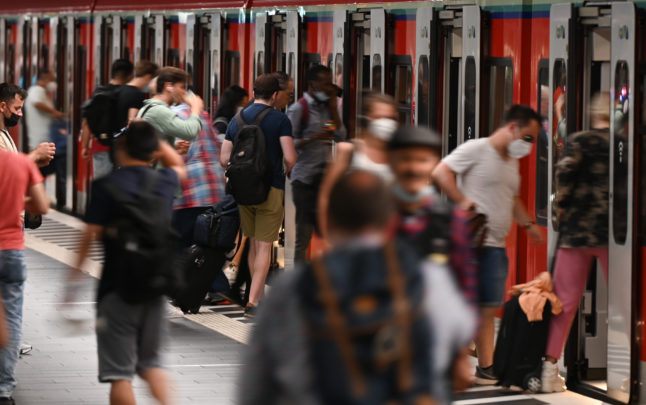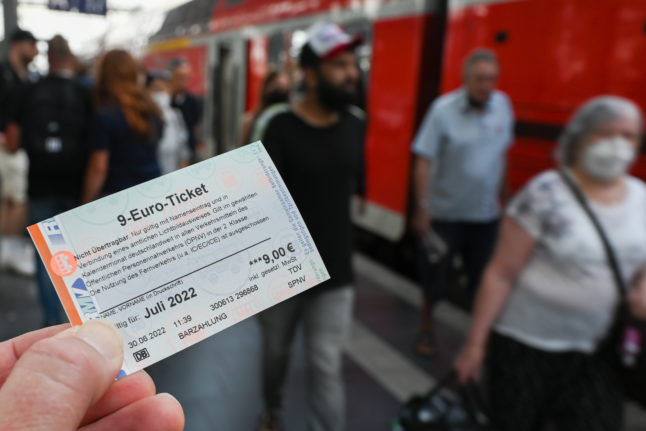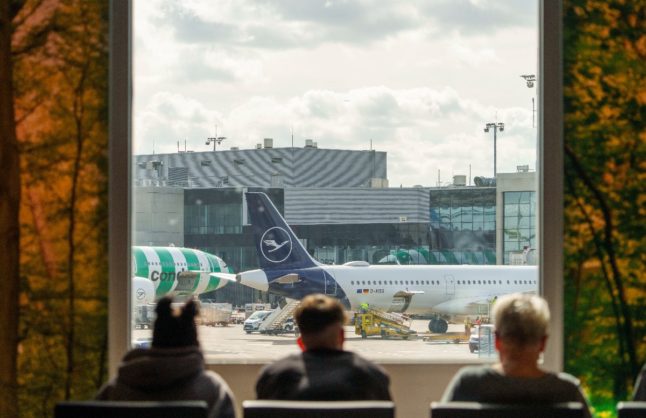It’s fair to say that the €9 monthly ticket experiment has made its mark on Germany. After it launched in June, millions of people took advantage of the heavily-reduced transport offer.
It allows people to travel on all public transport throughout the whole of Germany – including regional trains – for just €9 per month. That adds up to €27 in total for three months. Regular monthly tickets vary across the country, but typically cost around €80 to €100.
But has it persuaded people to switch from their cars to public transport? And what’s the political appetite for an extension, or a similar ticket after the offer expires at the end of the month? Here’s a look at the latest.
READ ALSO: €9 for 90: Everything you need to know about Germany’s cheap travel deal
What do politicians say about a €9 ticket follow-up?
Germany’s coalition government – made up of the Social Democrats, Greens and Free Democrats – are split on the future of low-cost travel tickets.
The climate-friendly Greens are pushing for a successor to come into force as soon as possible after the €9 offer ends. The ticket is an “inspiration” that shouldn’t be allowed to fade out, said Stefan Gelbhaar, Transport Expert of the Green parliamentary group in the Bundestag.
“We could find an interim solution for autumn,” he said, adding that this would give experts and politicians time to analyse exactly what a permanent ticket could look like.
But for this to happen, the Transport Ministry and the federal states would have to come to an agreement – and as quickly as possible.
Transport Minister Volker Wissing, of the Free Democrats (FDP), has repeatedly called the ticket a “success”, but stalls when it comes to the crucial question of financing.
Wissing points to the states taking on more of the costs. The Länder say they are interested in a follow-up ticket, but see it as the federal government’s turn to increase funding.
Meanwhile, the Finance Minister Christian Lindner, also of the FDP, has repeatedly ruled out a €9 ticket follow-up, saying the budget is not there.
“The fuel rebate and the €9 ticket are coming to an end,” Lindner told Bild am Sonntag. “There will be no follow-up regulation.”
But experts, like Philipp Kosok of the think tank Agora Verkehrswende, say both sides “belong at the same table”.
“The Transport Minister should not be allowed to get off lightly, and neither should the federal states,” he added.
READ ALSO: Germany’s €9 ticket should be extended by two months, say travel chiefs

So the ticket is popular in politics, and is helping people in the face of rising inflation (while also apparently helping stabilise inflation) – but no one wants to figure out how it could be funded in future.
Wissing recently said he wants to wait for studies to analyse the effect of the ticket before a possible follow-up offer is introduced either at the end of this year or next year.
What effect has the ticket had so far anyway?
In the beginning, the €9 ticket was primarily a socio-political instrument: a gift to the people in Germany amid the rising cost of living (although it is funded with tax revenues).
But it is perhaps not quite reaching one of the main goals of getting people out of theirs cars, initial studies suggest.
“We have very little shift effect,” said Christian Böttger, professor of transport at the Berlin University of Applied Sciences.
“So the idea of people switching from cars doesn’t seem to work.”
That is shown by mobile phone data, which can be used to evaluate the routes people take. Instead, customers who use public transport anyway are now using it even more thanks to the ticket.
However, Dresden mobility researcher Jan Schlüter is more positive. In his survey, seven percent of car drivers said they would now try public transport.
“Seven percent is a huge number, because it is only a limited period of time,” he said. “How many (more) people will just change their habits?”
READ MORE:
- Which foreign countries can you visit with Germany’s €9 ticket?
- How to explore Germany by train with the €9 ticket
- Nine of the best day trips from Frankfurt with the €9 ticket
- Nine of the best day trips from Munich with the €9 ticket
How much could a permanent ticket cost?
Even though some are calling for the €9 ticket to be extended for a limited time, most people believe that is not sustainable in the long-term.
“For the three months it was a super bargain offer,” said Stefan Gelbhaar from the Green Party. “But everyone knows that mobility costs money. People are willing to spend that.”
The idea that it doesn’t have to be super cheap is supported by initial survey data: depending on where they live, people are willing to pay significantly more. In the cities, for instance, transport customers are willing to pay around €60, says Schlüter, who is based at the TU Dresden.
“In rural areas it goes towards €100 or even more.”
The Association of German Transport Companies has proposed a ticket for €69 per month. But even that price would mean it would need subsidies of €2 billion. There have also been calls for a €365 annual ticket, and a €29 monthly ticket.
Discussions have also taken place about socially differentiated prices rather than one ticket for all. The Greens, for example, can imagine this particularly during the energy crisis. But others say that simplicity is the key, and that small-scale tariff could have a deterrent effect.
READ MORE:
- Could a €29 ticket replace Germany’s €9 transport offer?
- German transport operators float plans for €69 ‘Klimaticket
- What will happen after the €9 ticket offer ends?
Will different regions go there on way?
At the weekend, the Lower Saxony transport ministry said it considered a regional ticket possible that would apply to northern German states.
“If a nationwide ticket is not feasible, the five northern German states could also set something up as an alternative,” the Lower Saxony Ministry of Transport said.
But the state’s transport minister Bernd Althusmann (CDU) said a follow-up solution would only be possible with a significant increase in federal funding. “It can’t be the case that the federal government initiates the ticket, leaves the implementation to the states, lets itself be celebrated for the success and then doesn’t want to take responsibility for a follow-up solution,” he said.
Once again, it is the funding of the ticket that is preventing anyone from finding a solution on the future of low-cost transport in Germany.



 Please whitelist us to continue reading.
Please whitelist us to continue reading.
Member comments